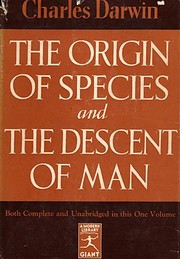

Cliquer sur une vignette pour aller sur Google Books.
|
Chargement... The Origin of Species / The Descent of Manpar Charles Darwin
 Actuellement, il n'y a pas de discussions au sujet de ce livre. aucune critique | ajouter une critique
Appartient à la série éditorialeGreat Books of the Western World (Volume 49) Modern Library Giant (G27) Est contenu dansContient
Aucune description trouvée dans une bibliothèque |
Discussion en coursAucunCouvertures populaires
 Google Books — Chargement... Google Books — Chargement...GenresClassification décimale de Melvil (CDD)575.8Natural sciences and mathematics Life Sciences, Biology Physiological systems in plants Origin of speciesClassification de la Bibliothèque du CongrèsÉvaluationMoyenne: (4.19) (4.19)
Est-ce vous ?Devenez un(e) auteur LibraryThing. |
|||||||||||||||||||||||||||||||||||||||||||||||||||||||||||||||||||||||||||||||||||||||||||||||||||||||
My first interest in CD grew from my Amherst College Shakespeare Professor Theodore Baird's essay, "Darwin and the Tangled Bank," where he concludes, "in 1859, at one of the great moments of modern thought, literature and science were united."* Baird quotes great passages from Darwin, starting with "Voyage of the Beagle," where "no fact in the long history of the world is so startling as the wide and repeated extermination of its inhabitants," and the Cormorant playing with the fish it caught, "Eight times successively the bird let its prey go, then dived after it"(TB 164). Or in the Andes, the rushing steep mountain streams were "like thinking on time, where the minute that now glides past is irrecoverable."
I may add to my professor's crediting Darwin's writing, Darwin behaved like all good writers, wanting to revise what he had written. In a letter to fellow scientist Robert Hooker, "You ask about my book, & all that I can say is that I am ready to commit suicide: I thought it was decently written, but find so much wants rewriting."
Baird, now: "When in the 'Origin' Darwin came to express how Nature as a whole seemed to him, he, too, uses a metaphor. Nature, he said, is like something else, a struggle for existence, in which the fittest survive. The public instantly knew what he meant..."(TB 166).
Now Darwin, "As the species of the same genus usually have, though by no means invariably, much similarity in habits and constitution, and always in structure, the struggle will generally be more severe between them, if they come into competition with each other, than between the species of distinc genera. We see this in the recent extension over parts of the United States of one species of swallow having caused the decrease of another species. The recent increase of the missel-thrush in parts of Scotland has caused the decrease of the song-thrush"(ModL 60-61). Since the Song Thrush in the U.S. has the most wonderful song, pentatonic, only the black keys on the piano, I mourn such a reduction, though the Euro-thrush is a different creature. (See my book Birdtalk)
CD continues, "When we reflect on this struggle, we may console ourselves with the full belief, that the war of nature is not incessant, that no fear is felt, that death is generally prompt, and that the vigorous, the healthy, and the happy survive and multiply"(62).
In his next chapter, "This preservation of favourable individual differences and variations, and the destruction of those that are injurious, I have called Natural Selection, or the Survival of the Fittest." "It has been said that I speak of Natural Selection as an active power or Deity; but who objects to an author speaking of the attraction of gravity as ruling the movement of planets? Every one knows what is meant and implied by such metaphorical expressions; and they are almost necessary for brevity. So again it is difficult to avoid personifying the word Nature; but I mean by Nature only the aggregate action and product of many natural laws, and by laws the sequence of events as ascertained by us"(62).
"With the giraffe, the continued preservation of the individuals of some extinct high-reaching ruminant, which had the longest necks, legs etc., and could browse a little above the average height, and the continued destruction of those who could not browse so high, would have sufficed for the production of this remarkable quadruped"(178). "In the family of the shoveller-ducks, the lamellae are first used as teeth, then partly as teeth, and partly as sifting apparatus [as in the whale's baleen], and at last almost exclusivly for this latter purpose"(179).
"It has often been asked, if natural selection be so potent, why has not this or that structure been gained by certain species, to which it would apparently have been so advantageous? But it is unreasonable to expect a precise answer to such questions, considering our ignorance of the past history of each species..." I might ask why humans are not born with shoes, so advantageous...
"He who believes that some ancient form was transformed suddenly through an internal force or tendency into, for instance, one furnished with wings, will be almost compelled to assume, in opposition to all analysis, that many individuals varied simultaneously...To admit all this is, as it seems to me, to enter into the realms of miracle, and to leave those of Science"(183).
Delightful implications of cat ownership on flowers: "Humble-bees [bumble-bees] alone visit red clover, as other bees cannot reach the nectar...The number of humble-bees in any district depends in a great measure upon the number of field-mice, which destroy their combs and nests...Now the number of mice is largely dependent, as every one knows, on the number of cats..."
"Hence it is quite credible that the presence of a feline animal in large numbers in a district might determine, through the intervention first of mice and then of bees, the frequency of certain flowers in that district!"(59)
*First published in the American Scholar, Oct 1946. On my shelf, Baird's "The Most of It," ed William Pritchard. (Amherst College Press: Amherst, MA, 1999) (